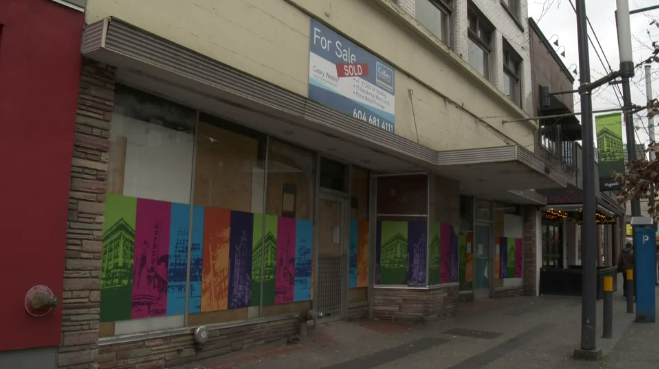The last time you went for a stroll on one of Vancouver’s high streets, did you notice a lot of empty storefronts?

One Vancouver business group says it’s a growing problem, and is calling for action from the city and province to aid entrepreneurs it says are struggling to make it work.
Michael Wiebe is co-president of the Mount Pleasant Business Improvement Association and a Vancouver Park Board commissioner.
He says there are several factors contributing to the proliferation of empty storefronts.
“Part of that is to do with how long it’s taking these businesses to get their permits,” Wiebe told CKNW’s The Simi Sara Show.
“So in Kingsgate Mall, you’re looking at a couple of open storefronts going, ‘Why is there so many?’ Some have already been rented but we won’t see them until September because they are going through the permitting process.”
Wiebe said that long wait for permits has many would-be landlords hesitant to rent to small businesses and start-ups, for fear the operation could go under or they could be on the hook for a period of free rent.
The end result, he argues, is either empty stores, or pot dispensaries and franchises that the landlord knows he can lock into a long-term lease.
WATCH: Granville Street falls back on hard times

The other major challenge, he said, is skyrocketing property taxes — particularly in areas that have seen recent rezonings.
“Certain neighborhoods that are getting new communities, new community plans, new zoning, are suddenly seeing 100 per cent increases on the property value, and that’s hitting the businesses really hard,” he said.
Wiebe pointed to the Rio Theatre, which was recently re-zoned for a 10 storey tower, as an example. With the rise in property value, Weibe said it is now essentially being taxed as a 10 storey building — creating incentives for the landlord to sell.
An empty storefront tax?
So what to do about the problem? On Friday, Wiebe appeared to walk back one more radical solution he floated to the Star Metro earlier this week: a commercial equivalent to the city’s Empty Homes Tax.
“I don’t really want an empty storefront tax. What we need to do is incentivize these businesses and property owners to allow entrepreneurs.”
One way would be to speed up permit approvals. Another would be to get creative about helping start-ups, a place where he said there can be a role for the city, too.
Wiebe pointed to the example of Nada, a zero-waste grocery store that wanted to set up shop in a City of Vancouver-owned building, but was rejected because he said the city didn’t have confidence in its business plan.
“How do we get a pop-up shop, how do we get businesses in there, how does the city of Vancouver maybe leverage some of their properties, and say maybe we do cheap rents the first year and then its going to double the year after, and then after you need to go to market rent. Kind of an incubator.”
Finally, Wiebe argued that the city needs to take a look at shifting some of the property tax burden from business owners to homeowners.
He said that just seven per cent of Vancouver’s land base is occupied by businesses, but they pay 44 per cent of the tax.
He said the province needs to take a second look at how its assessing commercial property value, and that the city needs to reassess its tax structure too.
“I think it’s time for residents to understand that they might need to pay $70 more per person and allow our commercial tenants to pay a little bit less so that we can keep those small businesses in Vancouver that can pay more to their staff, and we can have more sustainable neighbourhoods.”




Comments